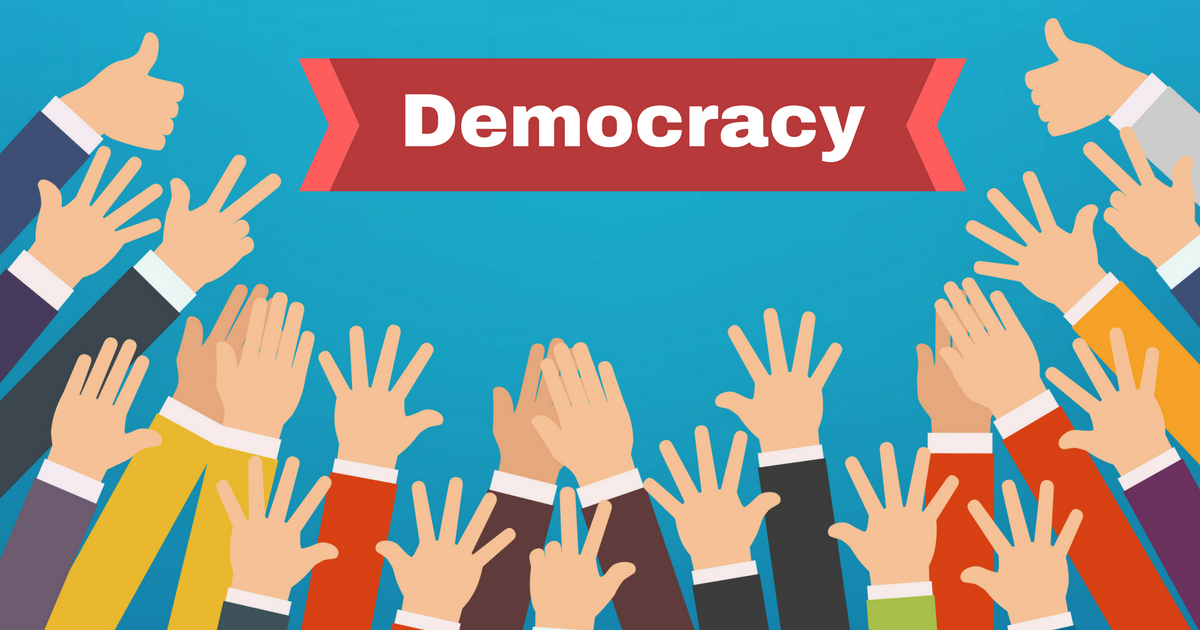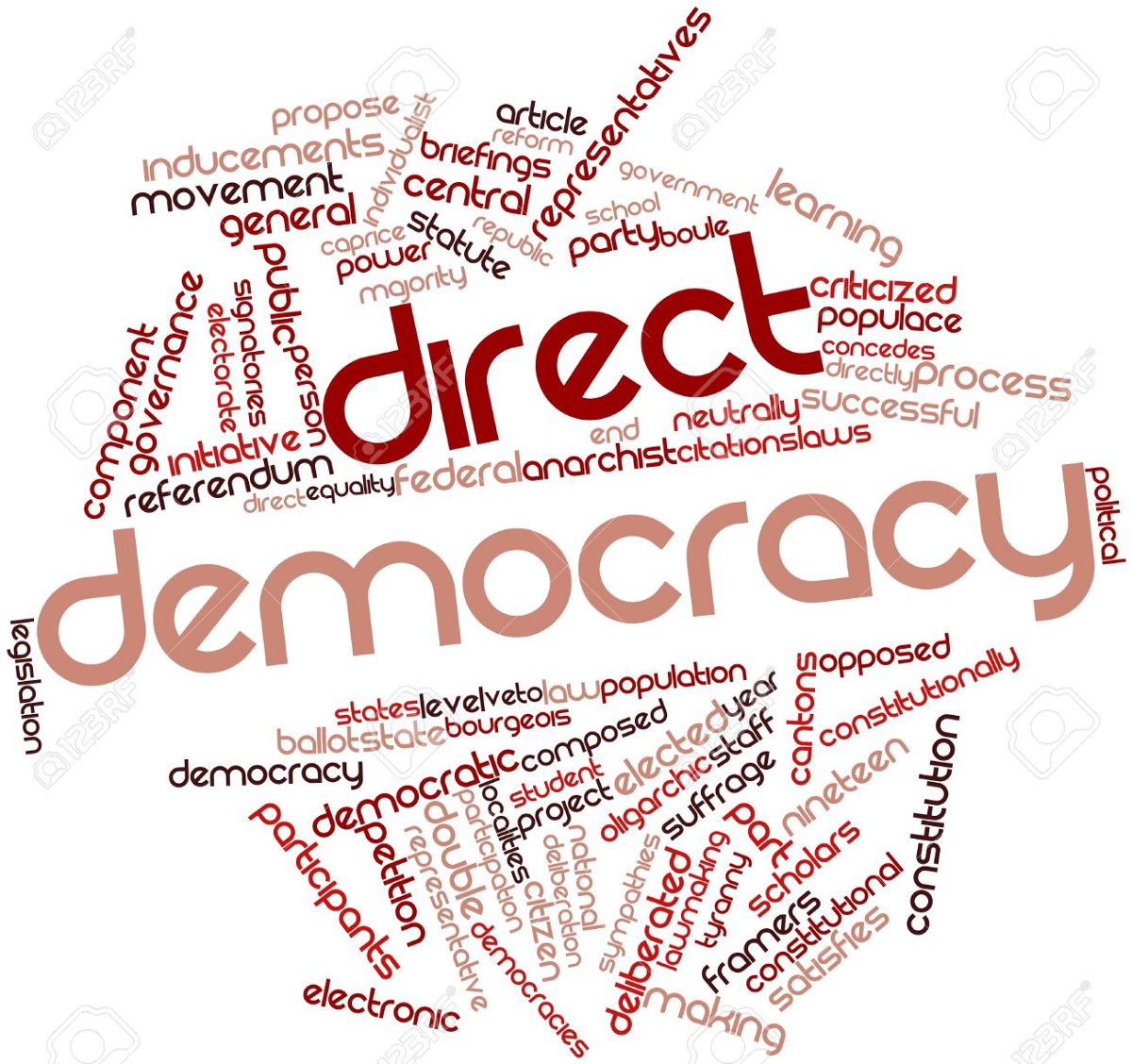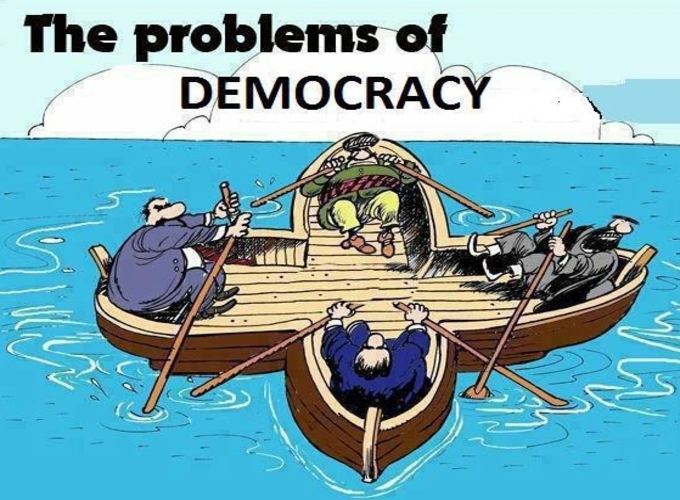Democracy and its Types
Democracy
By Arfat Hussain
MGM (BA-IJ)
student
MEANING:
The definition
of democracy is a form of government in which the common people hold
political power and can rule either directly or through elected
representatives. An example of democracy at work is in The United States, where people have political freedom and equality.
SOME MAJOR FEATURES OF A DEMOCRACY:
1. Popular
Sovereignty:
Democracy is based on sovereignty. People can
exercise their power in a democracy. They elect their representatives. The government
remains responsible for the common mass for its every omission and commission.
2. Political
Equality:
Democracy is based on political equality. It
means all citizens irrespective of caste, creed, religion, race or sex are
considered to be equal before the law and enjoy equal political rights. Political
equality gives the right to vote to every citizen.
3. Majority
Rules:
In
a democratic set-up actual government is carried out with the help of the party
which obtains the majority of votes. Support of the majority is accepted by all.
4. Federal:
It is another feature of Indian democracy. Article 1 of the Indian Constitution describes India as a union of states.
According to our Constitution, the states are autonomous. They have full
freedom in certain matters, and in some other matters they are dependent on
center.
5. Collective
Responsibility:
In Indian democracy, the Council of
Ministers both in states and center are collectively responsible to their
respective legislative. No minister is alone responsible for any act of the
government. The entire council of ministers is responsible for all the
activities.
6. Formation
of Opinion:
A democratic government must provide
institutions through which public opinion on various matters can be formed.
Legislature provides the most important platform to estimate and express public opinion.
7. Respect
for Opinion of Minority:
In a democratic setup, majority rules but
opinions of minorities are also given respect. They are encouraged to give
their opinion. Democracy being a government by free discussion and criticism
encourages both the positive and negative aspects of any proposal. The majority
must tolerate the opinion of the minority otherwise democracy will degenerate
into authoritarianism.
8. Provision
for Rights:
Democracy provides individual dignity by
giving various rights to the individual.
9. Rule
of Laws:
In a democracy, there is rule of law. It means the supremacy of law overall. Under any circumstance, the law cannot be compromised.
10. Rule
by Consent:
ADVERTISEMENTS:
Democracy is based on consent in general but
not on force or coercion. By collecting consent from the majority through dialogue,
debate, and discussion the problems can be solved.
11. Implies
open Society:
Democracy implies a free and open society.
Every activity of the government is based on public opinion. Different
associations, unions, organizations are formed to discuss the problems openly
and to find out the solution for the problems.
12. Government
by Compromise:
Democracy is a government by adjustment and
compromise. Different opinions are to be considered within the ruling party and
outside of the party. There is a plurality of ideas to which the government has
to take into consideration.
13. It
is a welfare Government:
Most of the democratic countries have welfare
government. Democracy is a powerful weapon through which all-round welfare is
possible. As a welfare government, it retains an individual’s freedom, liberty,
dignity, etc.
14. Independent
Judiciary:
Democracy is characterized by an independent
judiciary. The judiciary does not depend on the executive or legislature. No
government organ can influence the judiciary.
Direct Democracy
Direct democracy is where the citizens vote directly in elections. Each
citizen has one vote. This type of democracy is common is class elections and
other small organizational meetings. Ancient Athenians used direct democracy
when they voted. They indicated their vote by using colored shards of pottery. Direct
democracy or pure democracy is a form
of democracy in
which people decide on policy initiatives directly.
This differs from the majority of currently established democracies, which
are representative democracies. The
theory and practice of direct democracy and participation as its common
characteristic was the core of work of many theorists, philosophers and
politicians, among whom the most important are Jean Jacques
Rousseau, John Stuart Mill, and G.D.H. Cole.
In
direct democracy, people decide on policies without any intermediary. Depending
on the particular system in use, direct democracy might entail passing
executive decisions, the use of sorting, making laws,
directly electing or dismissing officials, and conducting trials. Two leading forms of direct democracy are participatory
democracy and deliberative democracy.
Indirect democracy
Indirect
democracy: is where citizens vote for representatives who
then go on to vote on issues. This exists in the United States in the form of
the people voting to send individuals to Congress. It also exists with the
Electoral College, as people do not vote directly for president but for a slate
of electors. Representative democracy
is also known as indirect
democracy, representative
government or is a type of democracy founded on the
principle of elected officials representing a group of people, as opposed
to direct democracy. Nearly all modern Western-style democracies are
types of representative democracies; for example, the United Kingdom is a unitary parliamentary constitutional monarchy, France is a unitary semi-presidential republic,
and the United States is a federal presidential republic.
It is an element of both the parliamentary and the presidential
systems of government and is typically used in a lower
chamber such as the House of Commons of the United
Kingdom, Lok Sabha of India, and maybe curtailed by
constitutional constraints such as an upper chamber. It has been described
by some political theorists including Robert A. Dahl, Gregory Houston and
Ian Liebenberg as polyarchy. In it, the power is in the hands of
the representatives who are elected by the people. Political parties are often
central to this form of democracy because electoral systems require voters to
vote for political parties as opposed to individual representatives.
Merits
1.
Democracies give people a chance to become personally
involved with their government.
2.
Democracy encourages equality in a positive way.
3.
The structure of democracy works to reduce issues with
exploitation.
4.
Democracies usually grow faster economically than other forms
of government.
5.
There is more consistency available in a democracy than other
government structures.
6.
Democracy does not create a centralized power base for ruling
over the people.
7.
People identify with their government to create a stronger
level of patriotism.
8.
Countries that use democracy are less likely to enter into
armed conflicts.
9.
A democracy transitions power smoothly while establishing
legitimacy.
10.
It encourages liberalism more than extremism.
Demerits
1. It sometimes leads to
establish the majority view over the minority view.
2. “Party leaders and political
office holders in government control the citizens and the members of the
party."
3. It does not encourage individuals to give their
opinions.
4. "It is a very expensive
form of government because elections have to be conducted periodically to the
various offices."
5. It is difficult to prevent corruption and
malpractices.
6. It is also known as government by amateurs and
leads to the domination of masses.
7. "The decision-making the process is slow in democracy as it involves long debates and deliberations in
the Parliament."
8. "Self-discipline, a good
conscience, and intellect are pre-requisites for every citizen to have a
successful democratic society."
9. "Self-interest is the
most common and a majority of the people is unwilling to subordinate it to the
general will of the community."
10.
“Democracy has
been characterized by these critics as monocracy; it produces quantity rather
than quality. This rule of the majority has at times proved to be the most incompetent
and worthless.”







Comments
Post a Comment